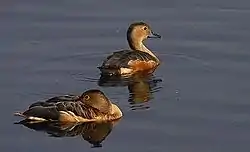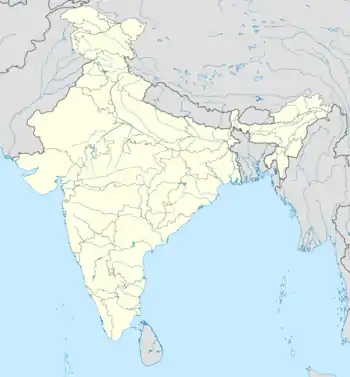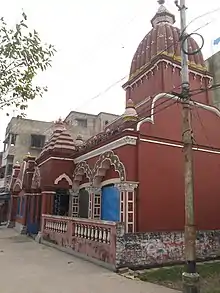Santragachhi
Santragachi, or Santragachhi, is a neighbourhood in Howrah, Howrah district, West Bengal, India. It is a part of the area covered by Kolkata Metropolitan Development Authority (KMDA). Santragachhi is mostly a residential locality with a sizeable railway colony with some industries, including a privately owned railway goods wagon making unit. Santragachhi has a railway station which serves as a railway junction-cum-terminus for the South Eastern Railway. Santragachhi is also popular for its large lake, known as Santragachhi Jheel, which attracts migratory birds in the winter months.
Santragachi | |
|---|---|
Neighbourhood in Howrah | |
 Lesser whistling duck in Santragachi Lake | |
 Santragachi Location in West Bengal, India  Santragachi Santragachi (India) | |
| Coordinates: 22.58017°N 88.26963°E | |
| Country | |
| State | West Bengal |
| District | Howrah |
| Region | Greater Kolkata |
| City | Howrah |
| Government | |
| • Type | Municipal Corporation |
| • Body | Howrah Municipal Corporation |
| Languages | |
| • Official | Bengali, English |
| Time zone | UTC+5:30 (IST) |
| PIN | 711109, 711111, 7111302 |
| Telephone code | +91 33 |
| ISO 3166 code | ISO 3166-2:IN |
| Vehicle registration | WB |
| HMC wards | 46, 47 |
| Lok Sabha constituency | Howrah |
| Vidhan Sabha constituency | Howrah Dakshin and Shibpur |
Santragachhi is under the jurisdiction of Jagacha Police Station and Santragachhi Police Station of Howrah City Police.
History
In the early twentieth century, Santragachhi was a large village, with a part within Howrah Municipality.[1] According to a legend, the principal family there, the Choudharys, who were Barendra brahmins,[2] started staying here 300 years from now.[1] Inspired by them, other Barendra families moved to the place.[1] The railway station of Santragachhi was named after this place, though this place is closer to another railway station at Ramrajatala.[1] The Ramrajatala area was considered a quarter of the area under this village.[1]
The first vernacular school of the Howrah district was established in Santragachhi in 1857 with the help of a government grant.[3] Afterwards the school was amalgamated with "Santragachi Madhya Engreji School" making it an English and Bengali dual medium school and later in 1925, the school transferred to Santragachi Kedarnath Institution.[4] The first girls' school of the Howrah district with Indian management was established in Santragachhi in 1863, with a small grant from the government.[5]
Santragachhi produced good quality of arums (ol: Bengali: ওল).[6] There is a variety of Amorphophallus paeoniifolius (elephant-foot yam of arum family) which is named Santragachhi after this place.[7][8]
Location

Other neighbourhoods of Howrah that surround Santragachhi are Ramrajatala, Jagacha, Baksara, Unsani and Garpha.
Transport
Railways
The erstwhile Bengal Nagpur Railway, now known as South Eastern Railway, was connected to Howrah station in 1900.[9] At this time, the 3-mile-long (5 km) short branch from Santragachhi to Shalimar Station was also created for redirecting heavy traffic of export goods, for further carrying them to Kidderpore dock in Kolkata via large ferry steamers.[9]
Santragachhi is the main railway coaching yard of South Eastern Railway's Kharagpur Division. Maintenance of more than 50 long or short-distance trains has been done here. The class-one flat yard consists of a diesel locomotive shed, an electric locomotive shed, washing and sick lines and a railway turntable.
Santragachi railway station is now a railway junction. There are plans of developing Santragachi Junction into a full-fledged terminal, with more trains originating and departing from here, over the next 3–4 years to reduce congestion at Howrah Station.[10]
Roadways

Santragachi is also close to the Kona Expressway, which connects to Kolkata via Vidyasagar Setu and towards rest of the NH 16 and to the NH 19. Many buses start from Santragachhi towards several neighbourhoods like - KB15 (to Anandapur), S119/1 (Mini) (to B.B.D. Bagh), EB1A (to Belgharia), VS12 (to New Town) etc. Many buses also pass through Santragachhi like - K11 (Domjur - Rabindra Sadan), 26 (Mini) (Unsani - Esplanade), C11 (Domjur - B.B.D. Bagh/Belgachia), E6 (Amta - Esplanade), E7 (Bagnan - Esplanade) etc.[11]
Kolkata Central Bus Terminus, spread over 12.38 acres (5.01 ha) of land, is the result of the joint efforts by the state transport department, HRBC and KMDA. While Kolkata Metropolitan Development Authority (KMDA) contributed in handing over land to install the facility, Hooghly River Bridge Commissioners (HRBC) remained the implementing authority. Chief minister Mamata Banerjee inaugurated the terminus on 27 May 2015. The terminus has a parking capacity for 169 buses, 100 other vehicles and 85 two wheelers.

Metro Rail
A 10 km (6.2 mi) east-west Metro extension project from Howrah Maidan to Santragachi bus terminus has been proposed. Rites, the implementing agency for this project, is set to start work on the corridor early in 2017.
Education
High schools
There are several secondary and higher secondary schools for boys and girls. Sir Ashutosh Mukherjee laid the foundation stone of Santragachi Kedarnath Institution, notable school in this area.[13] Other governmental schools include Santragachi Bhanumati Balika Vidhyalaya, S.E. Railway Mixed Higher Secondary School, Santragachi Mixed High School, and Santragachi Railway Colony High School, Baksara High School, Surendranath Girls' School, Jagacha High School etc. Private schools include St. Marys Convent School, Maria's Day School, and Usha Martin School. There is also a branch of Kendriya Vidhyalaya, which is affiliated to CBSE Board.
Colleges
Colleges in the area include Dr. Kanailal Bhattacharya College and Howrah Girls College.
Santragachhi Jheel


Santragachhi Jheel is a large lake,[14] located next to the Santragachi railway station.[15] This lake attracts large number of migratory birds in the winter months, particularly in December and January. The number has increased in recent years, as migratory birds have started to avoid destinations like the lakes in Alipore Zoo, Kolkata.[16] Birds like sarus crane from North America and Australia,[16] gadwall, northern shoveller, northern pintail, garganey from north of the Himalayas[17] and many other local migratory birds such as cotton pygmy goose and knob-billed duck are spotted here during this season.[17] However, the lesser whistling duck is the most dominant species visible here.[17]
The lake area is owned by South Eastern Railway, though the Forest Department of West Bengal also looks after the place.[15][17] Every year before the migratory birds are expected to arrive, the Forest department cleans Water hyacinth from the lake, though leaving some portion of it which adds up to an environment suitable for the birds.[17][18] Efforts are made by local residents, Forest Department and Railways to improve the environment for the birds.[17][18]

The Forest Ministry of the State Government of West Bengal intends to convert the lake to a wildlife conservation centre.[19]
Tibbetibaba Ashram
The Dalal Pukur area near Santragachhi host the Tibbetibaba Ashram: Tibbetibaba was a famous Bengali philosopher saint of India.[20] The ashram was established in November 1929. This ashram was given the name of Tibbetibaba Vedanta Ashram by his devotees and disciples. Land for the ashram was bought by a man named Bishnupada Chattopadhyaya. The first brick for the ashram was laid by Tibbetibaba himself. Later, more land for the ashram was bought by a man from the Entally area of Kolkata.[21][22][23]
References
- O'Malley & Chakravarti 1909, p. 172
- Barendra or Varendra was a region in northern Bengal.
- O'Malley & Chakravarti 1909, p. 140
- http://sknionline.in/history.html
- O'Malley & Chakravarti 1909, p. 141
- O'Malley & Chakravarti 1909, p. 73
- O'Malley & Chakravarti 1909, p. 74
- NIIR Board. Cultivation of Fruits, Vegetables and Floriculture. National Institute Of Industrial Research. p. 583. ISBN 81-86623-75-2. Retrieved 5 January 2009.
- O'Malley & Chakravarti 1909, p. 126
- "Santragachi to be developed into terminal in 3–4 years". Times of India. Times of India. Retrieved 26 May 2015.
- Google maps
- https://timesofindia.indiatimes.com/city/kolkata/2017-start-for-Howrah-EW-Metro/articleshow/55734781.cms
- https://in.locale.online/santragachi-kedarnath-institution-513740648.html
- Jheel (Bengali: ঝিল) is a Bengali word for a lake.
- Romila Saha (8 January 2008). "Bird draw at jheel". The Telegraph, Kolkata. Retrieved 6 January 2009.
- "Migratory birds no longer keen to nest at Alipore Zoo". Indian Express. 16 December 2008. Retrieved 5 January 2009.
- Suchetana Haldar (15 December 2006). "Birds of many feathers flock to Santragachi". Indian Express. Retrieved 6 January 2009.
- Bhajan Ganguly (8 December 2004). "Welcome, winter friends on wing". The Telegraph, Kolkata. Retrieved 6 January 2009.
- "Protected Area Update: News and Information from protected areas in India and South Asia". Wildlife Institute of India. February 2005. Archived from the original (DOC) on 10 April 2009. Retrieved 6 January 2009.
- Brahmachari, Akhandananda, Paramhamsa Tibbati Babar Smriti Katha, India: Tibbati Baba Vedanta Ashram, 76/3, Taantipara Lane, P.O. Santragachi, Howrah – 711 104, West Bengal (May, 2003), p. 1.
- Brahmachari, Akhandananda, Paramhamsa Tibbati Babar Smriti Katha, India: Tibbati Baba Vedanta Ashram, 76/3, Taantipara Lane, P.O. Santragachi, Howrah – 711 104, West Bengal (May 2003), p. 47.
- Chakravorty, Subodh, "Bharater Sadhak – Sadhika", India: Kamini Publication, 115, Akhil Mistry Lane, Kolkata – 700 009 (1997, Bengali calendar year 1404), Volume 1, p. 477.
- Misra, Kunjeshwar, Ramayan Bodh Ba Balmikir Atmaprakash, (2nd ed.) India: Tibbati Baba Vedanta Ashram, 76/3, Taantipara Lane, P.O. Santragachi, Howrah – 711 104, West Bengal (2006, Bengali calendar year 1413), p. 1.
Citations
- O'Malley, L.S.S.; Chakravarti, Monmohan (1909), Bengal District Gazetteers: Howrah, Bengal Secretariat Book Depot.
| Wikimedia Commons has media related to Santragachhi. |